|
From modest beginnings nearly a century ago in Milwaukee, Wisconsin, Heil today is a major force in the refuse carting and tank trailer equipment markets throughout the U.S., Europe, Asia and South America.
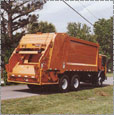
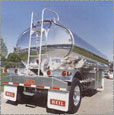
|
Heil is an outstanding example of a Dover stand-alone company that has grown its core business while expanding through seven add-on acquisitions.
The Heil Co. was founded in 1901 by Julius P. Heil. His business, the Heil Railjoint Company, pioneered the use of electric welding to produce fabricated steel products. The company continued to evolve with the development of the first steel truck body and the first electrically welded kerosene tank. The acquisition of Hydro Hoist Co. in 1919, brought with it the capability and technology to produce dump body hoists. Heilís original dump body business served as the foundation for its entry into the refuse collection market. In 1937, the company sold its first enclosed conveyor-type garbage bodies with rear-loading hoppers to New York City.
By 1970, company management moved manufacturing from Milwaukee to several other locations in order to reduce costs and achieve efficiencies that could only be realized in geographically decentralized, "built from scratch" state-of-the-art manufacturing plants. This expansion stretched Heilís financial limits.
In the late 1980ís, Heil senior management began to consider options for bringing in additional financing. The company at this time was owned by employees and senior management as well as by the Heil family. In considering an IPO versus a sale to an investor, two issues were paramount to the board: ensuring continued customer satisfaction with Heil products and continuing to provide the companyís more than 1,200 employees with good career opportunities.
"A companyís success depends on its employees," said Joseph F. Heil, Jr., "employees with the attitudes of ownership and know-how to do things right the first time. Putting the customer first has always been Heilís commitment to the industry, and we have proven that it works."
With these views in mind, the board decided against the idea of an IPO and instead pursued the sale of the business to another company that fit Heilís operating philosophy. This move eventually brought Heil and Dover together, but first, an investment banker was solicited to prepare an information package, screen potential buyers, and seek bids through a standard auction process.
Typically, management was concerned about what would happen as the sales process unfolded: Would there be any interest? At what price? Could they find a new owner with a similar business philosophy? What would happen to their jobs? What would be the reaction among customers if word of the potential sale leaked out?
Dover learned about the opportunity to purchase Heil very early in the auction process. At the first meeting between Dover and Heil executives, it was clear that a good fit existed if a price could be agreed upon. Each side agreed to find a middle ground.
|
|
|
|
"Dover lived up to all its promises. We have retained our management entirely, and funds have been readily available to grow the business."
Larry Gray
(Retired President and COO, The Heil Co.)
|
|
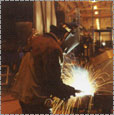
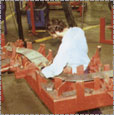
|
Senior executives at both companies then undertook a serious due diligence process. During this period, as every aspect of the acquisition was being debated, many potential deal-breaking issues were discussed and settled. Employees, meanwhile, were kept well informed of the merger and its implications for them.
Heil was acquired by Dover in 1993, and all of Heilís constituentsócustomers, employees, managers and ownersóremain pleased with the results.
Heil employees have even chosen to participate in Doverís 401K plan, giving them further opportunity to shape their own futures while sharing in a large corporationís strength.
Heilís two main lines of business were growing so rapidly at the time of its purchase that management decided to divide the company into two independent Dover operating companies: Heil Trailer International and Heil Environmental. In each case, the president of the new company had been the product line general manager prior to the Dover acquisition. Larry Gray, then Heilís President and COO, had planned to take early retirement after the sale, but instead, assumed a senior position with Dover Industries.
Since being acquired by Dover, both Heil Trailer and Heil Environmental have undergone significant change and growth.
Doverís investments in the two companies have included major capital expenditures, joint ventures, and acquisitions.
| |
|
|
|
|
|
|
|
|
|
|
"With Dover's resources and backing, we have substantially grown our core business and made key, synergistic acquisitions."
Bob Foster, President, Heil Trailer
|
|
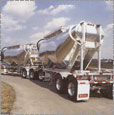
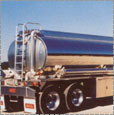
|
Heil Trailer
Since 1993, Heil Trailer has grown from a $68 million to a $160 million business with a major global presence. The companyís ability to provide its customers with a consistent product around the world has catapulted it into global leadership in the tank trailer and container market. "None of this would have happened had we not been bought by Dover," Heil Trailer president, Bob Foster said. "With Doverís resources and backing, we have substantially grown our core business and made key synergistic acquisitions."
Doverís financial backing meant that Heil Trailer could double the size of its flagship Athens, Tennessee facility, the "largest, most modern trailer equipment plant in the world," according to Foster. The plant serves as a laboratory where new products are developed before they are spun off for manufacture in Heil Trailerís plants around the world.
One of those plants, in Thailand, is a fully equipped modern manufacturing plant developed in conjunction with Heil Environmental and a local partner. The company builds trailers for gasoline and dry bulk products and manufactures refuse equipment in a very strategic part of the world. A newer global initiative is Heil Trailerís new facility in Argentina built to take advantage of the lucrative duty-free Latin American market.
Heil Trailer is represented in England by Thompson Carmichael, a 1998 add-on acquisition. Thompson Carmichael manufactures many of the same products as Heil Trailer as well as off-road equipment and aircraft refueling tanks for the military market. The acquisition offers Heil Trailer an opportunity to expand its sales in the growing European market.
In the United States, Heil Trailerís add-on acquisition in 1993 of J&L Tank of Rhome, Texas, has proved to be an extremely successful strategic move. J&L, a producer of tank trailers for dry bulk goods and cement, among other products, has boomed from an $8 million to a $30 million business thanks to a very aggressive growth strategy. Also on the rise is Trailmaster in Fort Worth, Texas, acquired by Heil Trailer in 1995. Trailmaster, the only U.S. manufacturer of stainless equipment for transporting crude oil, has been the beneficiary of Heil Trailerís $1 million capital investment and has grown from a $15 million to a $25 million business.
Heil Trailerís aggressive acquisition initiatives and significant capital investment in its core business demonstrate what can happen when Dover provides a strong company the financial backing it needs to achieve its ultimate potential.
|
|
|
|
|
|
|
|
|
|
|
|
"With Dover, everything has been open and above board. There are no hidden agendas. What you see is what you get."
Glenn Chambers, President, Heil Environmental
|
|
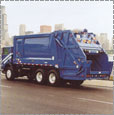
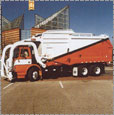
|
Heil Environmental
"When Dover started talking to us about their hands-off policy of letting us grow our own business, we were extremely skeptical," said Glenn Chambers, president of Heil Environmental.
"They told us we would be in a position to make long-term instead of short-term decisions for the good of the company. They said we had a good team and it should stay in place. All that was hard to believe. Everyone had a horror story about what happened when a company was sold to new owners. Eight years later, weíre still waiting for the horror stories to happen. With Dover, everything has been open and above board. There are no hidden agendas. What you see is what you get."
Chambers said that Dover has been extremely supportive of the decisions Heil Environmental has had to make in order to grow its garbage truck body business in an essentially mature market. "Theyíve helped us raise our expectations of what we can do," he said. "Dover has shown us how similar companies in the organization have been able to raise their profit margins. It has taken an investment in time and capital, but itís working."
Heil Environmental, with Doverís backing, has invested in several capital projects. Chambers particularly praised Doverís willingness to fund the construction and equipping of a training center for mechanics who work on refuse hauling trucks. Since the facility opened, more than 600 mechanics have been trained by Heil Environmental. They return home to report that Heil "does a fantastic job," he said.
Based in Chattanooga, Tennessee, Heil Environmental manufactures refuse truck bodies in Fort Payne, Alabama, Tishimingo, Mississippi, Phoenix, Arizona and Scotland. Third World countries offer the best opportunity for growth, Chambers said, and potential acquisitions exist in the U.K. and Latin America.
"But, we are not under any pressure. Dover has encouraged us to get our existing business in hand before moving into expansion," Chambers said.
| |
|
|
|
|
|
|
|
|
|